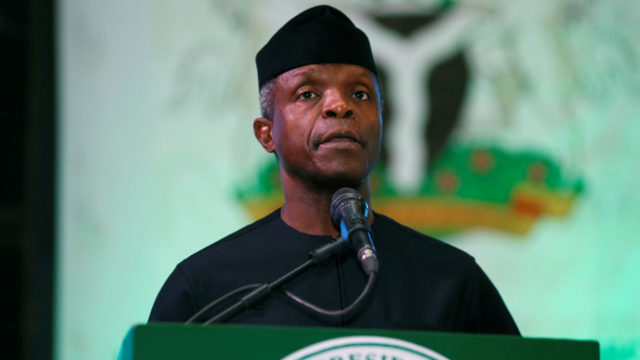Vice President Yemi Osinbajo, says the reasons why Nigerians are unwilling to pay more for electricity in the country is because of the poor supply of power.
Osinbajo, who expressed this view while featuring in a webinar on Economic Sustainability Beyond COVID-19 organised by Emmanuel Chapel in Abuja on Sunday, said Nigerians were willing to pay for electricity if the services they received from the distribution companies improved.
He added that citizens had been unhappy with the poor service from players in the power sector over the years.
“I have alluded to the argument that income elasticity is more important for persons living in the rural area and for the poor who need to have electricity for whatever means of livelihood they have.
“What we have discovered especially as we have worked with private sector to deploy solar power in different parts of the country is exactly the point raised by Nigerians.
“For example, in Wuna, a village which is just outside Abuja, they never had light until a private company provided solar power there. What they pay on average for their power is well in excess of the N37 per unit that we pay for power off the grid.
“Turankawa in Sokoto pays almost N100. So, from many of the areas where we have been it is evident that this business of people not willing to pay for power is not true at all.
“As a matter of fact the reason there is such great resistance is really the service level. Most people are used to poor service so they just see every tariff increase as injustice because they are getting poor service but are asked to pay more.
The vice president listed the Sabon Gari market in Kano, Ariaria market in Aba and in Sura market in Lagos and several different parts of the country as instances where people paid for better services.
According to him, the question really was one of service as there must be a way of guaranteeing service in exchange for tariff increase.

 Football1 week ago
Football1 week ago
 Health & Fitness2 days ago
Health & Fitness2 days ago
 Comments and Issues1 week ago
Comments and Issues1 week ago
 Featured6 days ago
Featured6 days ago
 Education7 days ago
Education7 days ago
 Business7 days ago
Business7 days ago
 Business6 days ago
Business6 days ago
 Crime7 days ago
Crime7 days ago

